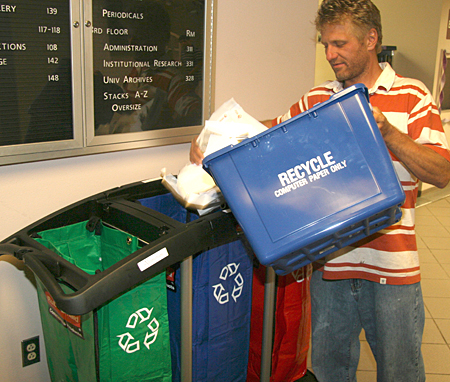Normal.dotm
0
0
1
717
4090
New Mexico Highlands University
34
8
5022
12.0
0
false
18 pt
18 pt
0
0
false
false
false
/* Style Definitions */
table.MsoNormalTable
{mso-style-name:”Table Normal”;
mso-style-parent:””;
font-size:12.0pt;”Times New Roman”;
mso-fareast-“Times New Roman”;
mso-bidi-“Times New Roman”;}

Margaret McKinney/Highlands University
New Recycling Program Launched at Highlands University
New Mexico Highlands University is launching a new campuswide recycling program this semester, adding to the university’s existing green initiatives.
“I think it’s extremely important for us to institute a great variety of programs that will move us towards making our campus even more green,” said Jim Fries, president of the university. “I’m thrilled that students have taken the initiative to establish a new recycling program.”
Ben Jeremiah, a junior in media arts, is the recycling coordinator. His is a half-time work study position within the Facilities Services Division. The plan is for two additional work-study students to join him.
Jeremiah, who graduated from culinary school and worked for 15 years as a professional chef, brings a lifelong passion for recycling to the new position. He also initiated successful recycling/sustainability programs at restaurants where he was the executive chef, such as the Gorge Grill in Hood River, Ore.
Jeremiah researched successful university recycling programs before submitting his proposal for a Highlands University program.
“We want to make recycling available, easy and cost effective,” Jeremiah said. “I want Highlands to be on the map for being a green university, and I think we can do it. It’s really important that we coordinate together to make this recycling program successful.
“It might sound corny but recycling is a huge way to help save the planet. When an individual places their plastic water bottle in the recycle container they’re taking a stand for the earth,” Jeremiah said.
The university purchased 34 lightweight roll-away recycling carts that will be conveniently located indoors at places like building entrances. The carts make it easy to separate recyclables into the right container, with red for plastic, green for aluminum, and blue for mixed paper.
“In phase one of the recycling plan this fall, the 34 carts will be located in almost every building on campus,” Jeremiah said. “It’s easy to toss your plastic, paper and aluminum into the right container instead of the trash. The university also purchased 100 blue bins for paper that are being placed in computer labs and copy rooms throughout campus.”
He said the recycling program will assess its effectiveness based on student, faculty and staff participation. More recycling carts may be purchased if needed.
Jeremiah said he needs to recruit as many people as possible who are interested in being recycling liaisons within their buildings. In addition, the program needs volunteers to take the bins of recycled materials each week to the university’s new recycling center behind the campus police station.
The City of Las Vegas will pick up the recyclable materials and haul them to its transfer station for processing.
To volunteer or ask Jeremiah recycling questions, contact him by e-mail at recycling@nmhu.edu
Jeremiah said the new recycling program will be reaching out to students to raise awareness and build support. Initial plans include working with the student senate, campus clubs, and the campus radio station, KEDP, to help get the word out. Skits on free movie nights at Ilfeld Auditorium are also in the works.
He will also put his media arts expertise to use designing materials like posters for the recycling program.
Marisol Greene, the university’s facilities and planning director, said: “People on this campus have shown overwhelming desire to be part of a recycling program at the university. Facilities is very excited to finally put it in place through Ben’s hard work.
“The recycling program will help students become knowledgeable consumers about what materials can be recycled,” Greene said.
She highlighted some other green initiatives at the university, including:
-A new 100,000-square-foot residence hall that is built green to LEEDS Silver certification, a high level of sustainability for water and energy use, materials and resource use, and indoor environmental quality. Cisterns also capture rainwater for the drought-tolerant landscaping at the residence hall.
-A conversion from large boilers to small package energy-efficient boilers to heat all main campus buildings. The new boilers also use less water and no chemicals. This multi-year boiler conversion project is nearly completed.
-Bike racks were installed around campus fall semester 2008 to encourage more bicycling and less driving.
